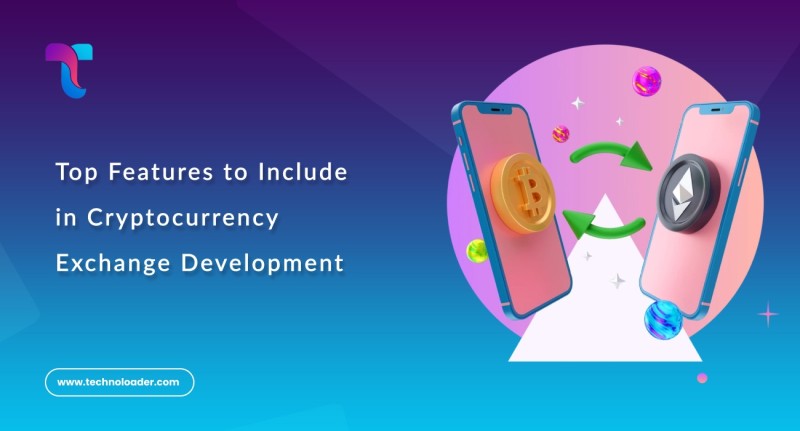As the cryptocurrency market matures in 2025, cryptocurrency exchange development has gained immense popularity..
Whether you're an entrepreneur, a fintech startup, or an established enterprise, entering the crypto trading space demands careful planning, especially when it comes to features, security, user experience, and compliance.
In this blog, we’ll break down the top 10 must-have features in cryptocurrency exchange development, along with other crucial aspects like development cost and tips to choose the right crypto exchange development company.
Top Features to Include in Cryptocurrency Exchange Development
Below are some of the major features that should be incorporated while developing a crypto trading exchange. These features will definitely help you in enhancing its functionality. By hiring a top blockchain development company, you can include all these features.
Secure User Registration and KYC Verification
Every successful exchange starts with a secure and smooth onboarding process. Users should be able to register using email, mobile, or social logins. KYC (Know Your Customer) verification helps comply with legal regulations and prevents fraud. Integrating third-party KYC services like Jumio or ShuftiPro streamlines this process and ensures verified users gain access quickly.
Multi-Currency Wallet Integration
A secure wallet system is essential for storing and managing digital assets. Your exchange should support both crypto wallets (for tokens like BTC, ETH, USDT) and fiat gateways. Hot wallets provide fast transactions, while cold wallets store assets offline for security. Multi-signature wallets add an extra layer of protection, especially for institutional clients.
Robust Trading Engine
The trading engine is the core of any exchange. It matches buy and sell orders in real-time and handles order executions. A high-performance engine should support multiple order types, market, limit, stop-limit and ensure low latency. This ensures accurate pricing, smoother trading, and enhanced user trust.
Real-Time Order Book and Trade History
An interactive and live-updating order book helps users visualize market activity. It should show real-time buy/sell orders, executed trades, and allow filtering by pairs. Additionally, trading history, depth charts, and volume analytics can help users make informed decisions directly within the platform.
Liquidity Management System
Without strong liquidity, users may face slippage or unexecuted orders. A good exchange aggregates liquidity from internal pools, external APIs (like Binance or CoinAPI), or through market-making partners. This ensures that traders can execute large orders with minimal impact on the market price.
Two-Factor Authentication and Security Protocols
With increasing cyber threats, top-tier security is non-negotiable. Two-factor authentication (2FA) using Google Authenticator or SMS codes ensures secure account access. Additionally, the platform should include features like SSL encryption, anti-DDoS protection, and IP whitelisting. Regular security audits help detect vulnerabilities before hackers do.
Admin Dashboard for Exchange Operators
An intuitive admin panel helps exchange owners manage the platform efficiently. Key functionalities should include user KYC approval, transaction monitoring, fee management, liquidity adjustments, and security alerts. Admins should also have control over wallet balances and be able to suspend suspicious accounts in real-time.
Integrated Payment Gateway for Fiat Transactions
To allow fiat-to-crypto transactions, integrating trusted payment gateways is essential. This lets users deposit funds via credit/debit cards, bank transfers, or mobile wallets. You can also integrate services like MoonPay or Simplex to process payments securely and globally.
Advanced Charting and Analytics Tools
Empower your users with real-time market insights. Integrate tools like TradingView for live candlestick charts, technical indicators, and historical data. Let users customize chart views, apply technical overlays (e.g., MACD, RSI), and analyze patterns without needing external tools.
Mobile App Accessibility
In 2025, over 70% of crypto trades will happen via mobile. Offering a responsive, feature-rich mobile app for Android and iOS is essential. Your app should mirror desktop functionalities, offer biometric logins, push notifications, and a seamless trading experience—even on slower networks.
Cryptocurrency Exchange Development Cost in 2025
Developing a cryptocurrency exchange can cost anywhere from $30,000 to $300,000+, depending on several factors.
Cost Factor |
Estimated Cost Range |
Basic MVP Exchange |
$30,000 – $50,000 |
Centralized Exchange (CEX) |
$60,000 – $120,000 |
Decentralized Exchange (DEX) |
$80,000 – $150,000 |
Hybrid Exchange |
$100,000 – $250,000 |
Advanced Trading Engine |
$20,000 – $50,000 |
Mobile App for iOS/Android |
$10,000 – $30,000 |
Security Features & Audits |
$5,000 – $25,000 |
Ongoing Maintenance (Annual) |
$10,000 – $50,000 |
You can significantly reduce development costs by outsourcing to India-based crypto exchange development companies, which typically offer 40–60% cost advantages compared to firms in the US or Europe.
How to Choose the Right Crypto Exchange Development Company
Selecting the right crypto exchange development partner can make or break your project. Here are the key criteria to consider:
Proven Industry Experience
Choose a company that has built crypto exchanges before. Check their portfolio for centralized, decentralized, and hybrid models. Experience ensures better project execution and faster delivery.
Security Expertise
Ensure the company follows secure coding practices and offers regular penetration testing, encryption, and DDoS protection. They should also guide you through regulatory compliance and KYC/AML protocols.
Customization Capabilities
Avoid cookie-cutter solutions. A good development partner should tailor the UI/UX, trading logic, wallet types, and admin dashboards according to your business model and target audience.
Post-Launch Support
Launching the platform is just the beginning. Choose a team that offers post-deployment services including server monitoring, feature upgrades, bug fixes, and user support.
Client Reviews & Ratings
Check platforms like Clutch, GoodFirms, or Trustpilot for client testimonials. Honest reviews give you insights into project communication, delivery time, and quality assurance.
Final Thoughts
The crypto trading landscape is evolving rapidly. To compete in this high-stakes market, your exchange must offer best-in-class features, user-friendly design, and unmatched security. The ten features discussed here form the foundation of a powerful cryptocurrency exchange.
However, building a high-performance platform requires more than just development skills it needs the right strategy, technology, and support.
If you're ready to launch your crypto exchange, partner with an experienced crypto exchange development company like Technoloader that understands blockchain, security, and market demands in 2025.
